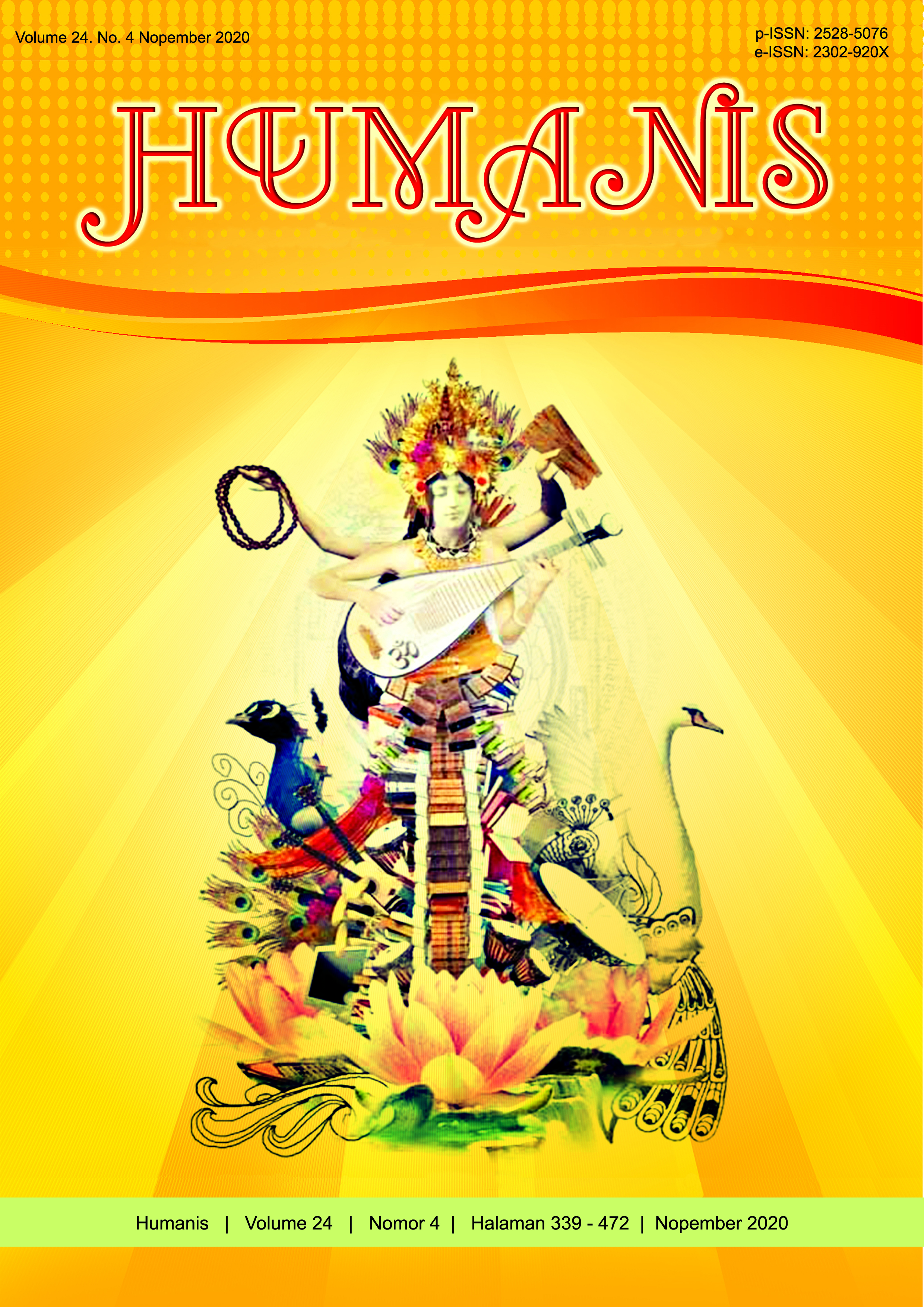Tradisi Makawas Pada Kehidupan Sosiokultural Masyarakat Bali Mula
Abstract
The community in Sekardadi Village, sub-district Kintamani, district Bangli are the community of Bali Mula which has a variety of activities in a Hindu background which is manifested through religious ceremonies. Religious activitiy that contain traditional values ??expressed through a tradition are makawas. Makawas tradition is one of a series that has important elements in religious ceremonies that are routinely carried out by the Sekardadi village community. The research aims at finding out: (a) how the implementation and mechanism of the makawas tradition in the socio cultural life community of Bali Mula and (b) how the function of the Makawas tradition in the socio cultural life community of Bali Mula in Sekardadi Village. The results showed that makawas tradition was routinely carried out by the Sekardadi village community based on the belief of a mitohistorical in the form of gratitude and blessing. The implementation of makawas tradition starts from preparing all the ceremonial and kawas needs. Then after all the means ceremonial have been prepared, Jero Kubayan began to provide kawas and banten to Ida Sang Hyang Widhi Wasa. Further Pepare distributed the kawas to Pradulu Ulu Apad and krama pengarep. The meaning of religion from makawas tradition is manifestation of the relationship between Ida Sang Hyang Widhi Wasa stated in one of the Tri Hita Karana elements in the form of Prahyangan which means the relationship between humans and God and as a mean for people’s life that is to form a solidarity relationship.
Downloads
References
Agus, Arnoldus Yansen. 2018. “Ritual Penti Pada Masyarakat Desa Ndehes Kecamatan Wae Ri’i, Kabupaten Manggarai Flores NTT”. Jurnal Humanis Fakultas Ilmu Budaya Unud Volume 22 No.1.
Budiartawan, I Ketut. 2016. “Mitos dan Realitas dalam Cerita Lisan Asal Mula Masyarakat Desa Bayung Gede”. Jurnal Humanis Fakultas Ilmu Budaya Unud Volume 14 No.1.
Dalmenda dan Elian, Novi. 2016. “Makna Tradisi Tabuik oleh Masyarakat Kota Pariaman (Studi Deskriptif Interaksionisme Simbolik). Jurnal Antropologi Volume 18 No.2.
Damsar, 2015. Pengantar Teori Sosiologi. Jakarta: Prenadamedia.
Dewi, Ni Made Ayu Ratna. 2017. “Ritus Metoh-Tohan Pada Masyarakat Desa Maniklyu, Kecamatan Kintamani, Kabupaten Bangli”. Program S1 Antropologi. Universitas Udayana Volume 21 No.1.
Faruk, 2010. Pengantar Sosiologi sastra: dari Strukturalisme Genetik sampai Post-Moder. Yogyakarta: Pustaka Belajar.
Ghazali, Adeng Muchtar. 2011. Antropologi Agama: Upaya Memahami Keragaman Kepercayaan, Keyakinan dan Agama). Bandung: Alfabeta.
Humaeni, Ayatullah. 2012. “Makna Kultural Mitos dalam Budaya Masyarakat Banten”. Jakarta. Jurnal Universitas Indonesia Volume 33 No.3.
Koentjaraningrat. 2009. Pengantar Ilmu Antropologi. Jakarta: Rineka Cipta.
Koentjaraningrat. 1987. Sejarah Teori Antropologi I. Jakarta: UI Press.
Laira, Merlin. 2016. “Upacara Mane’e Pada Masyarakat Kakorotan Kecamatan Nanusa Kabupaten Talaud. Jurnal Holistik Tahun IX No.18.
Pramana, Dewa. 2018. “Tradisi Naur Kelaci dalam Upacara Perkawinan di Desa Subaya, Kecamatan Kintamani, Kabupaten Bangli”. Program S1 Antropologi. Universitas Udayana Volume 23 No.1.
Putra, Hartawan Dana. 2017. “Makna Ritual Nyepeg Sampi dalam Upacara Usaba Kawulu di Desa Adat Asak Kabupaten Karangasem”. Jurnal Humanis Fakultas Ilmu Budaya Unud Volume 21 No.1.
Putri, Dewa Ayu Eka. 2016. “Kearifan Ekologi Masyarakat Bayung Gede dalam Pelestarian Hutan Setra Ari-Ari di Desa Bayung Gede, Kecamatan Kintamani Kabupaten Bangli”. Humanis Volume 15 No.2.
Rumansara, Enos. 2003. “Transformasi Upacara Adat Papua: Wor dalam Lingkaran Hidup Orang Biak”. Yogyakarta. Jurnal Universitas Gajah Mada Volume 15 No.2.
Suwarni, I Made. 2017. “Upacara Ngusabha Dalem di Pura Dalem Pingit Desa Pakraman Taro Kaja Kecamatan Tegallalang Kabupaten Gianyar (Perspektif Teologi Hindu)”. Jurnal Institut Hindu Dharma Negeri Denpasar. Volume 1, No1.
Pratiwi, Ni Wayan. 2017. “Upacara Ngerebeg di Desa Pakraman Manduang Kecamatan Kecamatan Klungkung Kabupaten Klungkung (Perspektif Pendidikan Agama Hindu)”. Jurnal Institut Hindu Dharma Negeri Denpasar. Volume 1, Nomer 2.


















